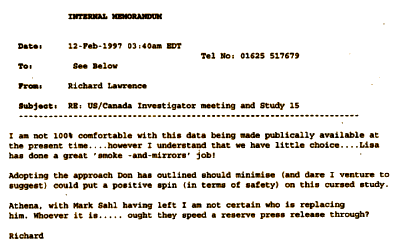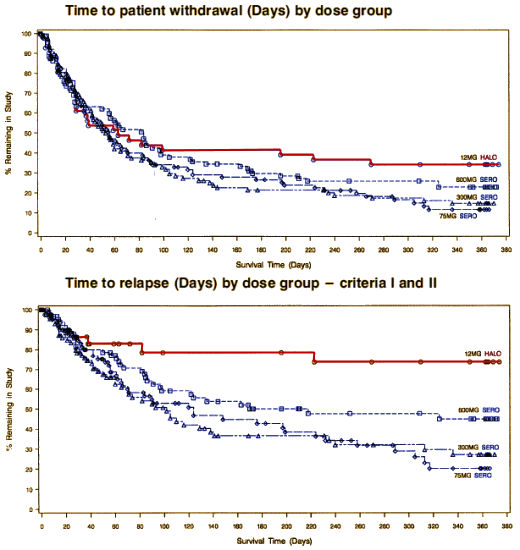Stephany has some interesting things going on at Soulful Sepulcher. She’s been interviewing one of the attorneys involved in the Seroquel litigation about AstraZeneca’s lackluster payoffs, even though they got off light. It’s worth a look. And she brought up Study 15, the one that showed Seroquel to be inferior to the older drugs before Seroquel even came to market, 10 years before CATIE – a study they never published:
Here’s the Memo and the graphs from Study 15 as a companion to her blog posts [from this]:
From 1993 through 1995, Astrazeneca undertook a large, multi-center trial comparing one of the older antipsychotics, Haldol, to several different dose ranges of their new drug, Seroquel [Study 15]. This was prior to Seroquel’s approval by the FDA. Study 15 didn’t come out like they wanted. The internal memo above is from a high ranking Astrazeneca official praising AZ Physician, Lisa Arvanitis, for her ‘smoke-and-mirrors’ job in trying to discount the actual results [‘smoke-and-mirrors’ in red]. As it turned out, Astrazeneca "buried" this study along with several others.
4.1.4 Summary of time to withdrawal / time to relapse
There was no statistically significant dose response among SEROQUEL groups in the time to withdrawal from the trial in the intent to treat population, which was the primary efficacy variable. Pairwise comparison showed no statistically significant differences among any treatment group, including haloperidol, in the time to withdrawal from the trial. There was also no statistically significant dose.response among the SEROQUEL groups in the time to withdrawal from the trial for psychotic relapse. Times to psychotic relapse were generally longer in the haloperidol group. Pairwise comparisons of the time to withdrawal for psychotic relapse revealed statistically significant differences between the haloperidol group and each SEROQUEL group. However, there was an imbalance in the reasons for withdrawal from the trial between the SEROQUEL and haloperidol treatment groups with proportionally more patients in the haloperidol group withdrawing for adverse events. Since proportionally more censoring for relapse occurred in the haloperidol treatment group, any contrasts between the haloperidol and SEROQUEL groups for time to withdrawal for psychotic relapse may not reflect true differences in the relapse distributions among the groups and therefore are non.informative. Results of the analysis of the time to withdrawal in the secondary population showed a similar trend as seen in the intent to treat population. The analysis of prognostic variables indicated that only the interaction between treatment groups and the need for neuroleptic medication to be tapered during Segment A were significantly associated with time to withdrawal.Haldol won the trial hands down – one of several examples of Astrazeneca suppressing it’s own studies because they didn’t play well with their marketing strategy [PsychRights has a treasure trove of equally incriminating documents]. As we know, Seroquel went on to be FDA approved with extension for a variety of conditions. It’s now the most lucrative of the Atypical Antipsychotics, themselves the most lucrative drugs in the American pharmacopeia.
It’s been 15 years, and the damage from AstraZeneca’s deceit is still being felt…


Ok, so truths like this come out continuously, and yet, our colleagues continue to write for these meds like pez in their offices. Hey, I write for them too, but, not to the frequency I see in my travels over the years with colleagues. I just want to ask at this site this one question: meds are not the sole answer to treating people with real psychiatric illness, and we all know there is no drug that has some risks as much as benefits, but, what the hell are we as psychiatrists to do at the end of the day when people have been so dumbed down by lies, deceit, and profit mongering that even when the truth is out and overt, they as patients still come in droves and want the damn pills and no other interventions?!
Besides, as much as the second generation meds have their evils, who is chomping at the bit to go on Haldol, Mellaril, or Thorazine in 2012? Maybe it is time for the masses in our profession to finally rise off their lazy, cowardly asses and call the system that is mental health care for what it is: sold out, careless, and just looking for easy outs to fill their wallets for whatever money they can make irregardless if the public is served right or wrong.
I read these revelations over the years and just wonder how so many psychiatrists just say nothing and do nothing of real substance to advocate for the public. And this comment will not change anything, I know that. But, maybe, people may just wake up some day soon and repeat the mantra from Network, “I’m mad as hell and not going to take it any more!”
That anger is still oh so silent, isn’t it, folks?
Thank you Mickey!
Hey Dr.Hassman, welcome to the “S” crowd 🙂 lol what a great comment!
Doc Hassman: I feel ya, brother. If it’s any consolation, you’re not the only one who feels this way. I’m beyond sick of the moral cowardice to the point where I’m actually somewhat drunkenly amused by it. In a detached, almost apathetic way.
I’ve said this before and I’ll say it again: psychiatry is but a microcosmal example of what’s going on at large in this country. The same moral cowardice, corruption, laziness and fear grips the economy and politics from the top down, and we’re so sluggish as a nation that we accept the lies the MSM hands us. How else to explain such recent news items that proclaim that people are “used” to $4 gas at this point, and it won’t hurt the economy? Or that the economy is getting better re the new unemployment figures and new jobs creation? Nobody seems to care that the UE stats are fudged like any psych study, and that most of those new jobs are jobs no one wants (temp part time jobs with no bennies). Or that the American election process is a sham and that left/right doesn’t matter anymore since both parties are bought out by the banking cartel. But somehow we just trudge along with that irrational American optimism that is tragically mis-matched for our slow-rot situation.
Hell, at this point I’m so fed up I’d almost WELCOME a societal meltdown. I’m almost convinced that that is exactly what it will take for people to wake the f*ck up at this point. I mean, everything is so gridlocked sometimes I think only armed revolution will work at this stage of the game.
Only history will tell if the US has passed the point of no return and the sun has begun to set on our empire…
Thanks Mickey
incredible
1 Boring Old Man
Great work, Stephany!
Thank you for posting, Mickey!
Duane
There’s even more to the Study 15 story. Yes, Haldol won the trial. But on some secondary measures of cognition, Seroquel was superior. So the symptom ratings and % of patients who relapsed were “vanished” and a paper appeared in Schizophrenia Research which claimed that Seroquel was superior to Haldol. In the abstract, it states: “Treatment with quetiapine at higher doses relative to haloperidol appears to have a positive impact on important domains of cognitive performance that have been found to predict role function and community outcomes in patients with schizophrenia.” Velligan DI et al., Schizophrenia Research 2002:53;239-248.
All the negative data magically disappeared and the paper then implies that Seroquel generates better “community outcomes” – even though the patients on Seroquel actually had worse outcomes. Those who control the evidence control evidence-based medicine.